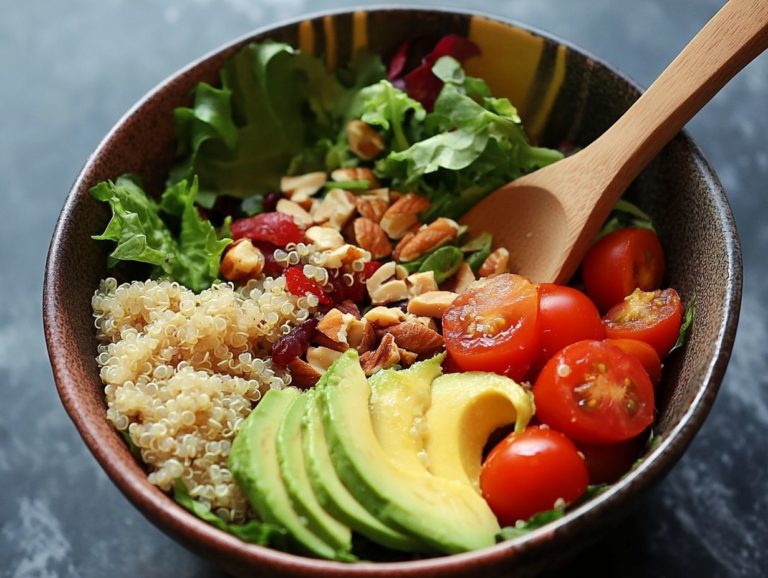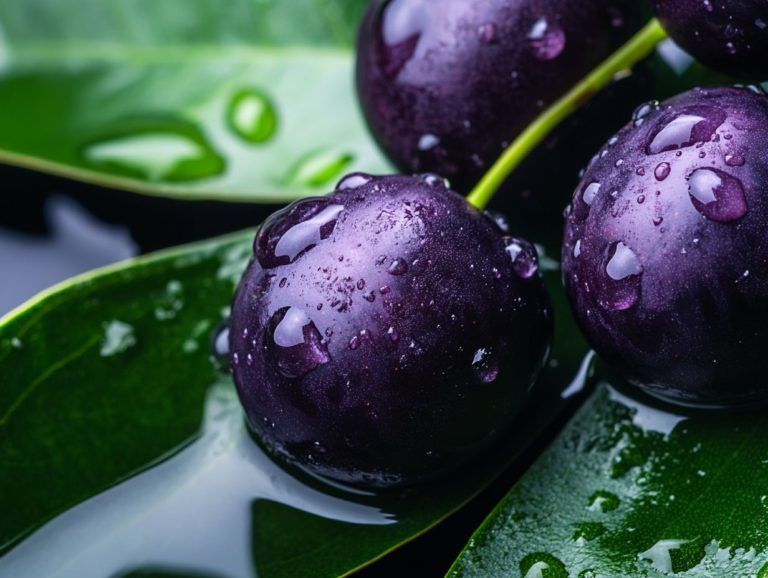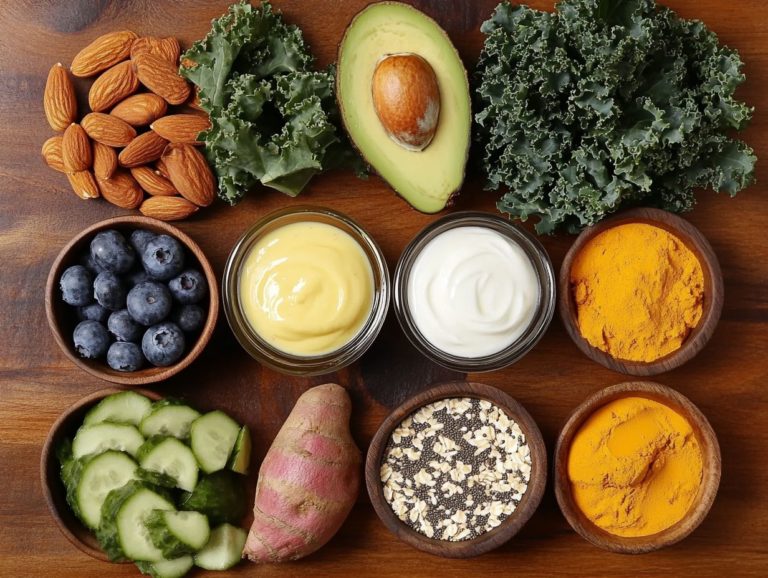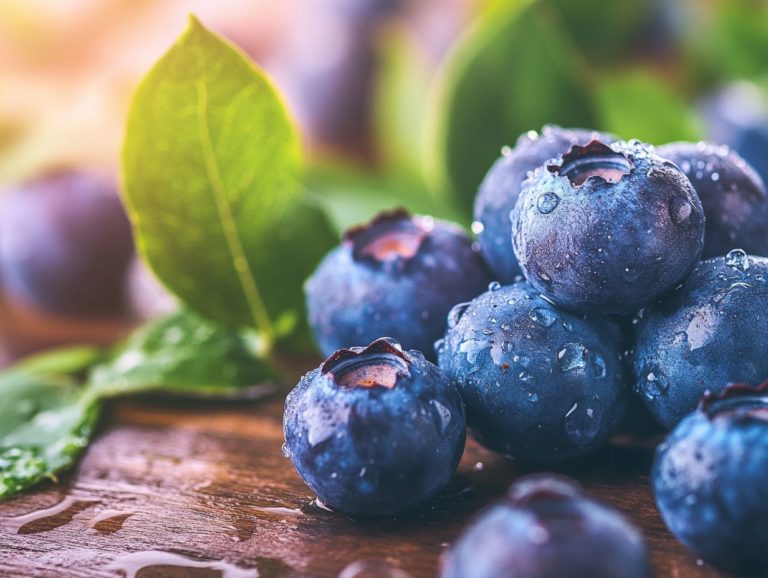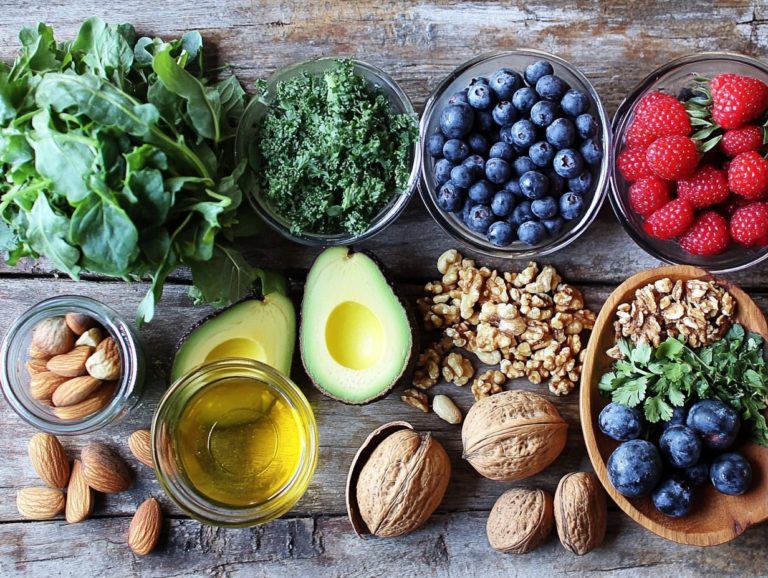Superfoods for Athletes: A Nutrition Guide
Superfoods have truly revolutionized the health and fitness landscape, particularly for athletes aiming to enhance their performance and recovery.
These rich-in-nutrients powerhouses provide a distinct advantage when it comes to fueling your body. This article dives into what superfoods are and unveils their remarkable benefits for athletes like you.
From the top superfood selections and their nutritional profiles to practical strategies for incorporating them into your daily meals, you ll discover everything necessary to elevate your nutrition game.
Let s explore superfood supplements and highlight any potential risks you should be aware of. Get ready to supercharge your nutrition now!
Contents
- Key Takeaways:
- Top Superfoods for Athletes
- Incorporating Superfoods into an Athlete’s Diet
- Supplementing with Superfoods
- Potential Risks and Side Effects
- Frequently Asked Questions
- What are superfoods and why are they beneficial for athletes?
- What are some examples of superfoods for athletes?
- How can incorporating superfoods into my diet benefit my athletic performance?
- Can superfoods help with muscle recovery?
- Do I need to eat large quantities of superfoods to see a difference in my athletic performance?
- Are superfoods a substitute for a balanced diet?
Key Takeaways:
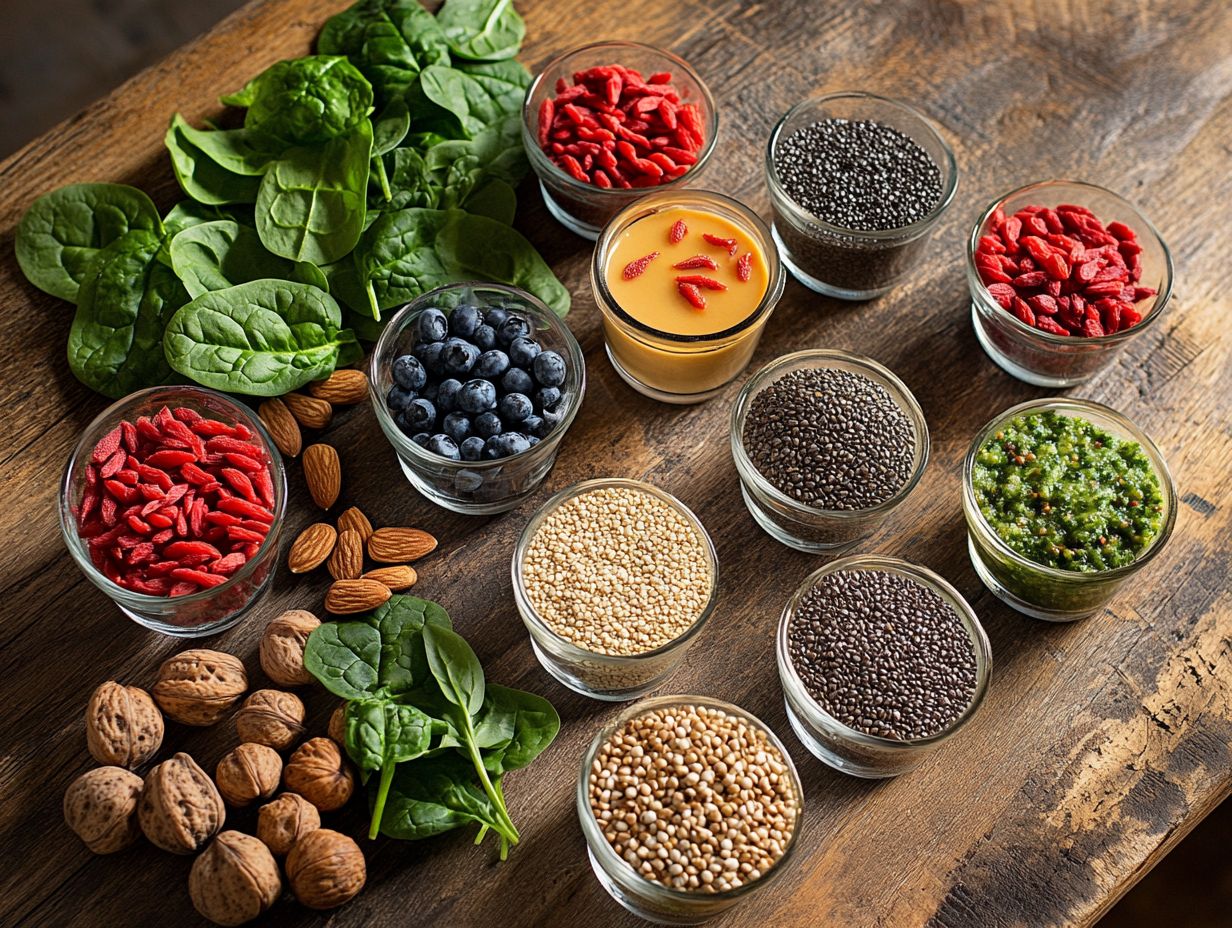
- Athletes benefit by adding superfoods to their diet, packed with essential nutrients that support performance and recovery.
- Top superfoods like berries, leafy greens, salmon, and quinoa provide vital nutrients, including antioxidants and Omega-3s.
- Consider superfood powders or capsules for added convenience and focused nutrition.
What are Superfoods and Why are They Beneficial for Athletes?
Superfoods are your ticket to nutrient-rich fuel that delivers impressive health benefits, especially if you’re an athlete aiming to elevate your performance through optimal nutrition. Think of these powerhouse foods like raw coconut, chia seeds, and spirulina as your allies, brimming with antioxidants and essential vitamins that support muscle recovery and energy production.
By weaving these superfoods into your meals, you re not just nourishing your body; you’re bolstering your immune system, enhancing gut health, and paving the way to achieve your fitness goals with greater efficiency.
These superfoods do more than just replenish glycogen stores after a workout; they come packed with anti-inflammatory properties that can help reduce muscle soreness and accelerate recovery times.
Nutritional champions like quinoa and sweet potatoes provide complex carbohydrates that elevate your energy levels and sustain endurance during those grueling training sessions.
Rich in essential fatty acids, these foods help keep your heart healthy and promote overall well-being. By incorporating a diverse range of superfoods into your daily diet, you re crafting a robust nutrition strategy that not only boosts your performance but also fortifies your resilience against fatigue, enhancing your health as an athlete.
Top Superfoods for Athletes
The finest superfoods for athletes encompass a range of nutrient-rich options, including raw coconut, chia seeds, spirulina, and raw chlorella. Each of these foods offers distinct benefits that support your athletic diet.
Along with these, incorporating beets, blueberries, and salmon into your meals will provide you with essential omega-3 fatty acids and dietary fiber, boosting your energy levels, enhancing muscle strength, and promoting overall recovery.
Benefits and Nutritional Value of Each Superfood
Each superfood presents its own unique benefits and nutritional value. Take spirulina, for instance a high-protein powerhouse that’s essential for your well-rounded diet. Then there are avocados, loaded with healthy fats that are crucial for your athletic performance.
Foods like chia seeds and beets can keep you hydrated and energized, thanks to their rich dietary fiber and nitrates. And let s not overlook blueberries, which are packed with antioxidants that aid in muscle recovery and help reduce inflammation.
Quinoa deserves a special mention too; it’s a remarkable addition to your diet, containing all nine essential amino acids that make it a complete protein source perfect for muscle repair and growth.
Incorporating sweet potatoes into your meals provides a bounty of complex carbohydrates along with beta-carotene, enhancing your endurance and promoting overall well-being by reducing oxidative stress.
Don t forget walnuts, either! They re rich in omega-3 fatty acids, supporting cognitive function and helping to minimize muscle soreness after those intense workouts.
By integrating these diverse superfoods into your meals, you can elevate your performance while nurturing long-term health benefits.
Incorporating Superfoods into an Athlete’s Diet
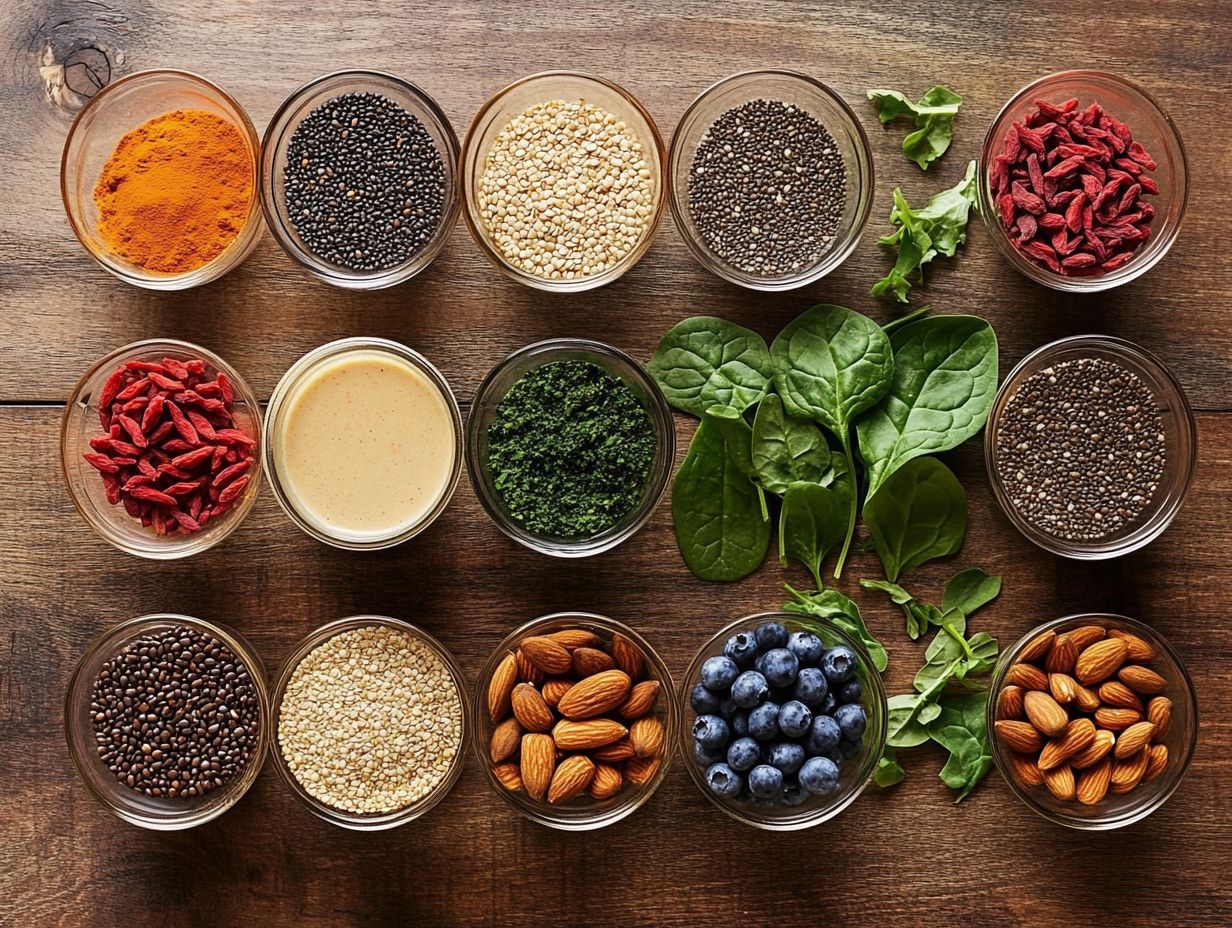
Incorporating superfoods into your diet requires thoughtful meal planning and a discerning selection of high-quality ingredients. This ensures you receive optimal nutrients each day. Superfoods are nutrient-rich foods that can boost your health. By integrating superfoods such as quinoa, oats, and raw coconut into your meals, you can enhance your nutritional intake.
Also, think about including healthy snacks featuring spirulina and chia seeds to effectively fuel your training sessions.
Practical Tips and Recipes
Incorporating superfoods into your daily meals can be both enjoyable and rewarding. Consider crafting delicious recipes that feature ingredients like raw chlorella, chia seeds, and beetroot juice. These will elevate both flavor and nutrition.
For a refreshing treat, simple smoothie recipes blending spinach and blueberries offer a delightful taste while delivering numerous health benefits perfect for your post-workout recovery.
To streamline smoothie preparation, prep your ingredients the night before. Stashing them in the fridge sets you up for a quick blend in the morning, making healthy choices effortless.
Don t overlook the power of chia seeds; just a tablespoon can enhance your omega-3 intake and help keep you feeling full throughout the day.
If salads are more your style, consider adding quinoa a high-protein grain along with kale and avocado. This combination results in a vibrant dish that s brimming with nutrients.
When snacking, think about raw energy bites made with dates, nuts, and cacao powder. Not only are they easy to prepare, but they also deliver a satisfying energy boost without the added refined sugars.
Supplementing with Superfoods
Supplementing with superfoods offers athletes a seamless solution to meet their dietary requirements, especially during hard training sessions. Incorporating superfood supplements like spirulina and raw chlorella powders into your smoothies or meals can easily enhance your energy levels and improve your nutrition for better performance.
When and How to Use Superfood Supplements
Understanding when and how to incorporate superfood supplements can significantly enhance your training regimen and overall performance. For instance, adding spirulina to your pre-workout routine can provide a much-needed energy boost.
Sipping on beetroot juice after your workout may assist in muscle recovery and hydration. Tailor these supplements to your training schedule for the best results.
Some athletes find a pre-workout boost more beneficial, while others may see more value in post-workout intake. If you re focusing on endurance training, taking chlorella in the morning can elevate your stamina throughout the day.
Hydration also plays a vital role; proper fluid intake complements nutrient absorption. This ensures that powerhouse ingredients like acai and maca deliver their full benefits to your body.
Paying attention to meal timing is equally important. Consuming superfoods on an empty stomach can sometimes enhance absorption, while pairing them with healthy fats can optimize nutrient uptake.
Potential Risks and Side Effects
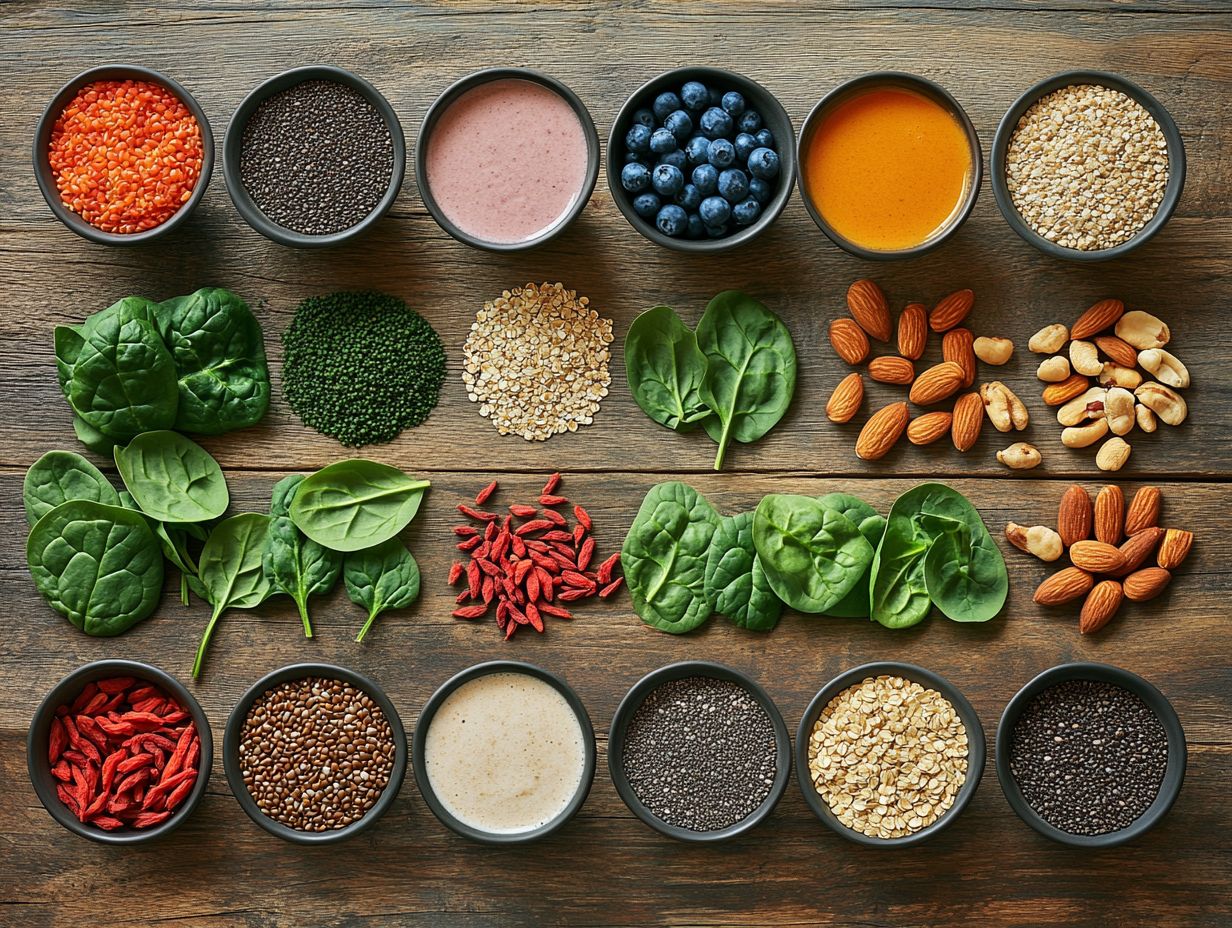
While superfoods present a wealth of health benefits, it’s crucial for you as an athlete to recognize the potential risks and side effects. These may include digestive discomfort from an overload of dietary fiber.
By understanding these precautions, you can confidently and safely integrate these nutrient-dense foods into your diet. This will maximize their advantages while minimizing any drawbacks.
Start incorporating superfoods into your meals today and feel the difference in your training!
Precautions and Warnings for Superfood Consumption
When consuming superfoods, it’s essential for athletes to take specific precautions, particularly if they have underlying health conditions or are using dietary supplements that might interact with these foods.
It’s best to talk to a healthcare professional about how to get the right nutrients.
Superfoods can boost your athletic performance significantly, but you must remain mindful of individual dietary restrictions, such as gluten intolerance or nut allergies, that could lead to adverse reactions.
Certain superfoods, like spirulina or goji berries, may have blood-thinning effects or interact with medications for diabetes or hypertension.
Keep a food diary and talk to a nutritionist. This helps you understand your health better. You can enjoy the maximum benefits of these nutrient-rich foods without compromising your well-being.
Frequently Asked Questions
What are superfoods and why are they beneficial for athletes?
Superfoods are nutrient-dense foods that provide a high amount of vitamins, minerals, and antioxidants. They are beneficial for athletes because they help improve performance, boost energy levels, and aid in muscle recovery.
What are some examples of superfoods for athletes?
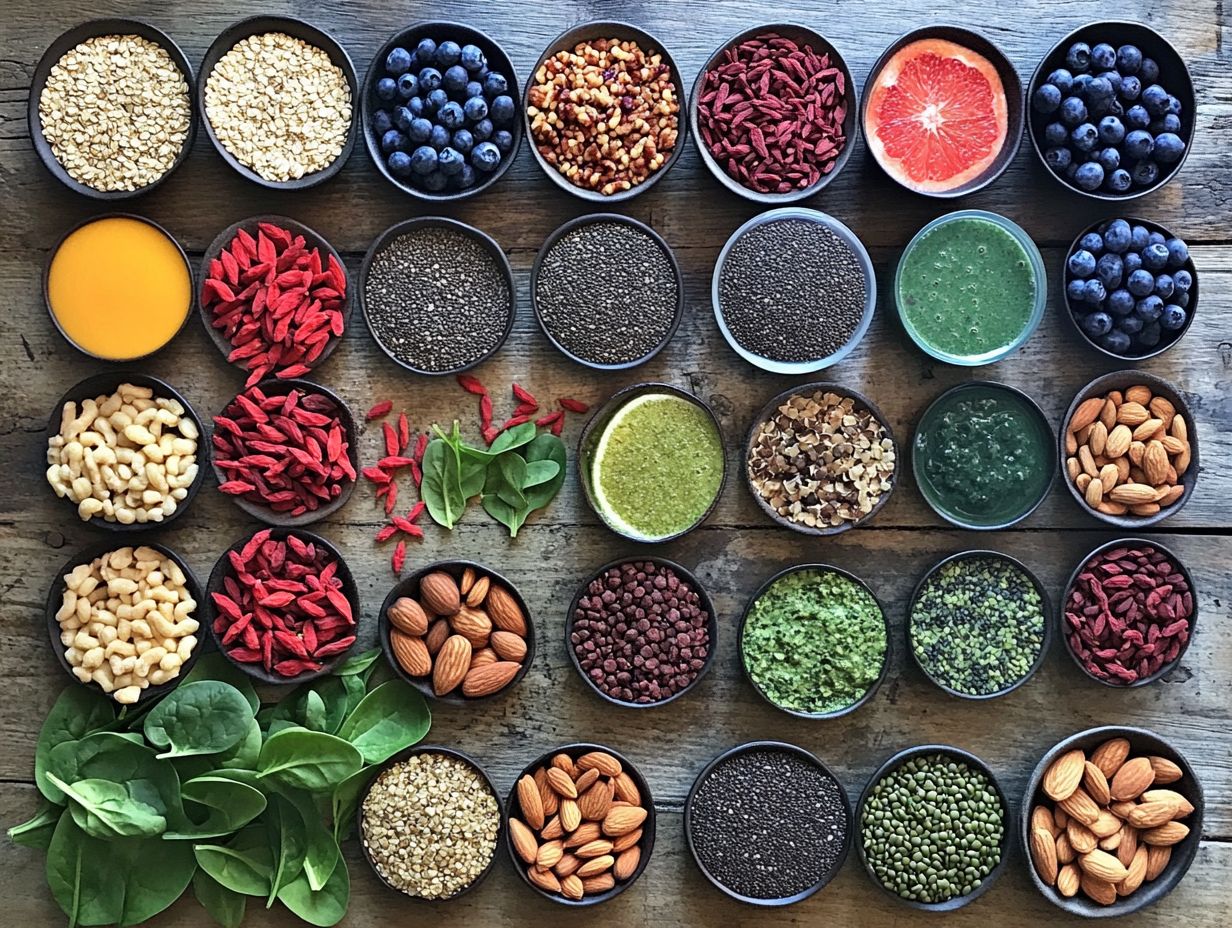
Some examples of superfoods for athletes include blueberries, spinach, quinoa, salmon, sweet potatoes, and chia seeds. These foods are rich in nutrients that are essential for athletic performance and recovery.
How can incorporating superfoods into my diet benefit my athletic performance?
Incorporating superfoods into your diet can benefit your athletic performance by providing your body with the necessary nutrients for optimal performance, improving endurance and strength, and reducing inflammation and muscle soreness.
Can superfoods help with muscle recovery?
Yes, superfoods can help with muscle recovery by providing essential nutrients that aid in repairing and rebuilding muscle tissue. They also help reduce inflammation and speed up healing making your recovery faster than ever!
Do I need to eat large quantities of superfoods to see a difference in my athletic performance?
No, you do not need to eat large quantities of superfoods to see a difference in your athletic performance. In fact, incorporating a variety of superfoods in moderate amounts can provide a well-rounded source of nutrients for optimal performance.
Are superfoods a substitute for a balanced diet?
No, superfoods should not be used as a substitute for a balanced diet. While they are beneficial for athletes, it’s important to consume a variety of whole foods to ensure you are getting all the necessary nutrients for optimal health and performance.

